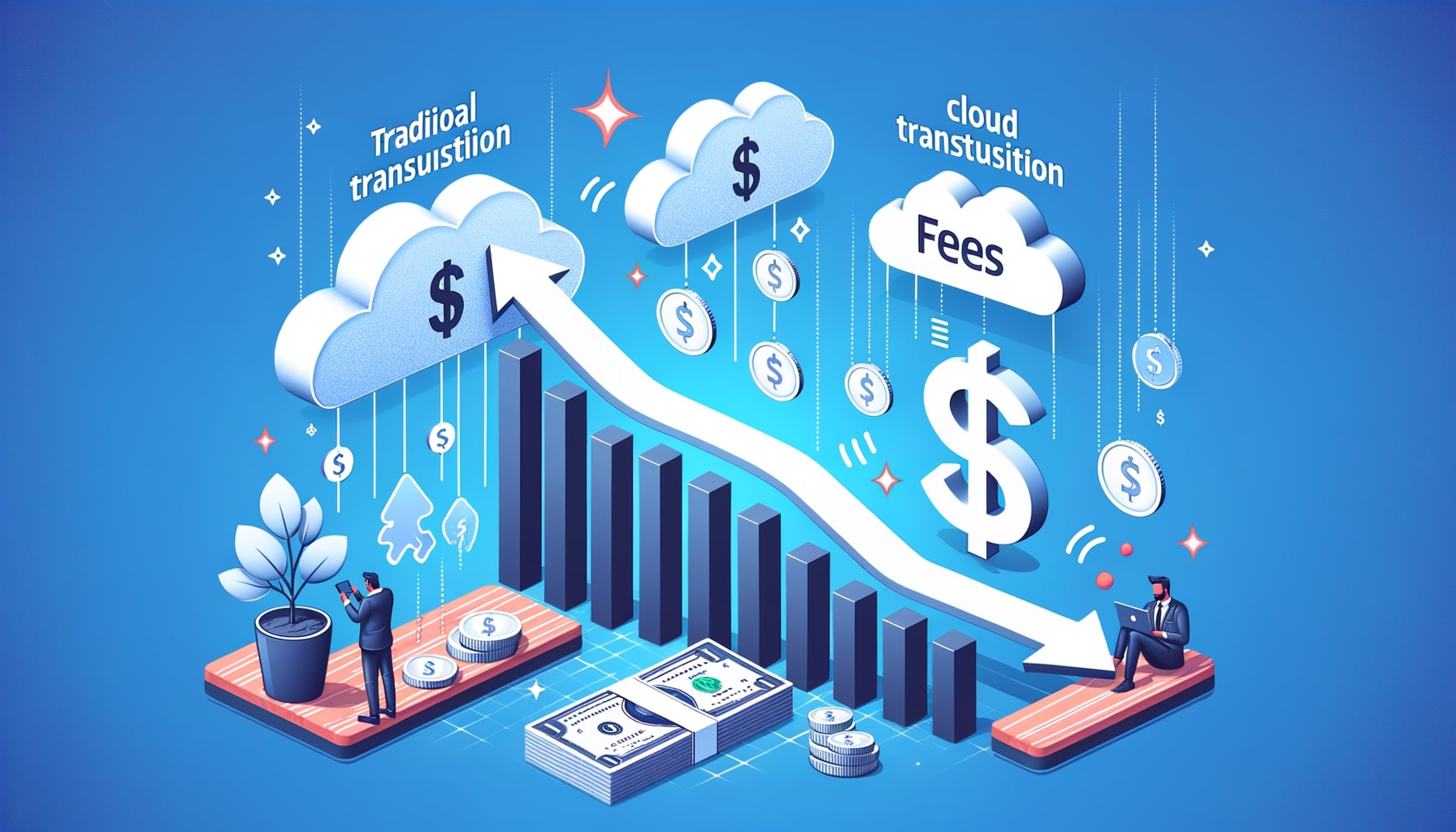How to Choose the Best Cloud Payment Processor for Your Business
In today’s digital age, businesses are increasingly relying on cloud-based solutions to streamline their operations and improve efficiency. One area where cloud technology has made a significant impact is in payment processing. Cloud payment processors offer a range of benefits, including enhanced security, seamless integration with existing systems, and advanced reporting and analytics capabilities. However, with so many options available, choosing the best cloud payment processor for your business can be a daunting task.
In this article, we will explore the factors to consider when selecting a cloud payment processor and provide guidance on making an informed decision.
Factors to Consider When Choosing a Cloud Payment Processor
1. Security and Compliance Features
Security should be a top priority when selecting a cloud payment processor. Look for processors that offer robust encryption and tokenization technologies to protect sensitive customer data. Additionally, ensure that the processor is compliant with industry standards such as Payment Card Industry Data Security Standard (PCI DSS) to minimize the risk of data breaches and fraud.
2. Integration Capabilities with Existing Business Systems
Consider the compatibility of the cloud payment processor with your existing business systems. Look for processors that offer seamless integration with popular e-commerce platforms, point-of-sale (POS) systems, and accounting software. This integration will enable you to automate payment processes, synchronize data, and streamline your overall operations.
3. Pricing Models and Transaction Fees
Evaluate the pricing models and transaction fees offered by different cloud payment processors. Some processors charge a flat fee per transaction, while others have tiered pricing based on transaction volume. Consider your business’s transaction volume and average ticket size to determine which pricing model aligns best with your needs. Additionally, be aware of any hidden fees, such as setup fees or monthly minimums, that may impact your overall costs.
4. Customer Support and Service Level Agreements (SLAs)
Reliable customer support is crucial when dealing with payment processing issues. Look for cloud payment processors that offer 24/7 customer support through multiple channels, such as phone, email, and live chat. Additionally, review the service level agreements (SLAs) provided by the processor to ensure they guarantee uptime and response times that meet your business requirements.
5. Reporting and Analytics Features
Effective reporting and analytics capabilities can provide valuable insights into your business’s payment trends, customer behavior, and overall financial performance. Look for cloud payment processors that offer comprehensive reporting tools, customizable dashboards, and real-time analytics. These features will enable you to make data-driven decisions and optimize your payment processes.
6. Scalability and Flexibility
Consider the scalability and flexibility of the cloud payment processor to accommodate your business’s growth. Look for processors that can handle increasing transaction volumes without compromising performance. Additionally, assess whether the processor supports multiple payment methods, such as credit cards, debit cards, mobile wallets, and alternative payment options, to cater to a diverse customer base.
7. Additional Features and Value-Added Services
Some cloud payment processors offer additional features and value-added services that can enhance your business’s payment capabilities. These may include recurring billing, subscription management, invoicing, virtual terminals, and multi-currency support. Assess your business’s specific needs and determine which additional features would provide the most value.
Assessing Security and Compliance Features of Cloud Payment Processors
When it comes to processing payments, security is of utmost importance. As a business owner, you must ensure that your customers’ sensitive payment information is protected from unauthorized access and potential data breaches. When evaluating cloud payment processors, consider the following security and compliance features:
1. Encryption and Tokenization
Look for processors that utilize strong encryption algorithms to protect payment data during transmission and storage. Encryption ensures that sensitive information, such as credit card numbers, is converted into unreadable code, making it virtually impossible for hackers to decipher. Tokenization, on the other hand, replaces sensitive data with unique tokens, further reducing the risk of data exposure.
2. PCI DSS Compliance
Payment Card Industry Data Security Standard (PCI DSS) is a set of security standards established by major credit card companies to ensure the secure handling of cardholder data. When selecting a cloud payment processor, verify that they are PCI DSS compliant. Compliance with these standards demonstrates that the processor has implemented robust security measures and undergoes regular audits to maintain data security.
3. Fraud Detection and Prevention
Effective fraud detection and prevention mechanisms are essential for any cloud payment processor. Look for processors that employ advanced fraud detection tools, such as machine learning algorithms and behavioral analytics, to identify and mitigate fraudulent transactions. Additionally, consider processors that offer chargeback management solutions to help you resolve disputes and minimize financial losses.
4. Secure Payment Gateway
A secure payment gateway acts as a bridge between your business’s website or POS system and the payment processor. It encrypts payment data during transmission, ensuring that it remains secure throughout the transaction process. When evaluating cloud payment processors, assess the security features of their payment gateway, such as SSL/TLS encryption and secure tokenization.
5. Data Redundancy and Backups
Data redundancy and regular backups are crucial for ensuring business continuity and protecting against data loss. Look for cloud payment processors that have redundant data centers and backup systems in place. This ensures that your payment data is replicated across multiple locations, minimizing the risk of data loss due to hardware failures or natural disasters.
Evaluating Integration Capabilities with Existing Business Systems
Seamless integration with your existing business systems is essential for maximizing the efficiency and effectiveness of your payment processes. When evaluating cloud payment processors, consider the following integration capabilities:
1. E-commerce Platforms
If your business operates an online store, ensure that the cloud payment processor integrates seamlessly with your e-commerce platform. Popular e-commerce platforms such as Shopify, WooCommerce, and Magento have a wide range of payment processor integrations available. Verify that the processor you choose supports your preferred e-commerce platform and offers a smooth checkout experience for your customers.
2. Point-of-Sale (POS) Systems
If you have a physical retail store, integration with your POS system is crucial. Look for cloud payment processors that offer compatibility with popular POS systems such as Square, Lightspeed, or Vend. This integration enables you to accept payments in-store and synchronize sales data with your payment processor, simplifying reconciliation and inventory management.
3. Accounting Software
Integration with your accounting software can streamline your financial processes and eliminate manual data entry. Look for cloud payment processors that integrate with popular accounting software such as QuickBooks, Xero, or FreshBooks. This integration allows you to automatically sync payment data, invoices, and transaction details, reducing the risk of errors and saving time on reconciliation.
4. Customer Relationship Management (CRM) Systems
Integration with your CRM system can provide valuable insights into your customers’ purchasing behavior and enable targeted marketing campaigns. Look for cloud payment processors that offer integration with popular CRM systems such as Salesforce, HubSpot, or Zoho CRM. This integration allows you to capture customer data during the payment process and automatically update customer profiles in your CRM system.
5. Custom Integration Options
In some cases, your business may require custom integration with specific systems or applications. When evaluating cloud payment processors, inquire about their custom integration options and APIs (Application Programming Interfaces). Custom integration allows you to tailor the payment process to your unique business requirements and ensures a seamless flow of data between systems.
Comparing Pricing Models and Transaction Fees of Cloud Payment Processors
Pricing is a critical factor to consider when choosing a cloud payment processor, as it directly impacts your business’s profitability. Different processors offer various pricing models and transaction fees, so it’s essential to evaluate them based on your business’s transaction volume and average ticket size. Here are some common pricing models and transaction fees to consider:
1. Flat Fee per Transaction
Some cloud payment processors charge a flat fee per transaction, regardless of the transaction amount. This pricing model is often suitable for businesses with low transaction volumes or small average ticket sizes. However, it may not be cost-effective for businesses with high transaction volumes or large average ticket sizes, as the flat fee can significantly impact profitability.
2. Tiered Pricing
Tiered pricing models categorize transactions into different tiers based on factors such as transaction volume, average ticket size, and card type. Each tier has a corresponding fee structure, with higher tiers typically attracting lower transaction fees. This pricing model can be advantageous for businesses with varying transaction volumes or average ticket sizes, as it offers more flexibility and potentially lower costs.
3. Interchange-Plus Pricing
Interchange-plus pricing is a transparent pricing model that separates the interchange fees charged by card networks from the processor’s markup. Interchange fees are set by the card networks and vary based on factors such as card type, transaction type, and industry. The processor’s markup is a fixed percentage or flat fee added to the interchange fees. This pricing model provides businesses with a clear breakdown of costs and allows for better cost control.
4. Monthly Fees and Minimums
In addition to transaction fees, some cloud payment processors may charge monthly fees or impose monthly minimums. Monthly fees can include account maintenance fees, gateway fees, or software fees. Monthly minimums require businesses to meet a certain transaction volume threshold each month; otherwise, they may be charged additional fees. Consider these additional costs when evaluating the overall pricing structure of a cloud payment processor.
5. International Transaction Fees
If your business operates globally or accepts payments from international customers, be aware of any additional fees associated with international transactions. Some processors charge higher fees for cross-border transactions or currency conversion. Evaluate these fees to ensure they align with your business’s international payment needs.
Analyzing Customer Support and Service Level Agreements (SLAs)
Reliable customer support is crucial when it comes to payment processing, as any disruptions or issues can directly impact your business’s revenue. When evaluating cloud payment processors, consider the following aspects of customer support and service level agreements (SLAs):
1. Availability and Response Times
Look for processors that offer 24/7 customer support through multiple channels, such as phone, email, and live chat. This ensures that you can reach out for assistance whenever issues arise, regardless of the time zone or business hours. Additionally, review the processor’s average response times to ensure they align with your business’s expectations and requirements.
2. Technical Support Expertise
Assess the technical expertise of the customer support team. They should have in-depth knowledge of the payment processing industry, as well as the specific features and functionalities of the processor. This expertise enables them to provide accurate and timely assistance, troubleshoot technical issues, and guide you through the setup and configuration process.
3. Service Level Agreements (SLAs)
Review the service level agreements (SLAs) provided by the cloud payment processor. SLAs outline the guaranteed uptime, response times, and resolution times for support requests. Ensure that the SLAs meet your business’s requirements and align with your customers’ expectations. SLAs that offer high uptime guarantees and fast response times are indicative of a reliable and customer-centric payment processor.
4. User Documentation and Knowledge Base
User documentation and a comprehensive knowledge base are valuable resources that can help you navigate the payment processor’s features and troubleshoot common issues independently. Look for processors that provide user-friendly documentation, tutorials, and FAQs. These resources can save you time and effort by providing self-service options for common inquiries.
5. Reputation and Reviews
Research the reputation and reviews of the cloud payment processor to gauge the experiences of other businesses. Look for testimonials, case studies, and online reviews to gain insights into the processor’s customer support quality. Positive reviews and a strong reputation indicate that the processor values customer satisfaction and provides reliable support.
Examining Reporting and Analytics Features of Cloud Payment Processors
Effective reporting and analytics features are essential for gaining insights into your business’s payment trends, customer behavior, and overall financial performance. When evaluating cloud payment processors, consider the following reporting and analytics capabilities:
1. Comprehensive Reporting Tools
Look for processors that offer a wide range of reporting tools to track and analyze payment data. These tools should provide detailed transaction reports, sales summaries, and reconciliation reports. Additionally, consider processors that offer customizable reports, allowing you to tailor the data and metrics to your specific business needs.
2. Real-Time Analytics
Real-time analytics enable you to monitor payment activity as it happens, providing immediate insights into sales trends and customer behavior. Look for processors that offer real-time dashboards and analytics, allowing you to make data-driven decisions on the fly. Real-time analytics can help you identify opportunities for upselling, cross-selling, and targeted marketing campaigns.
3. Payment Dispute Management
Disputes and chargebacks can impact your business’s profitability and reputation. Look for processors that offer robust dispute management tools and reporting capabilities. These tools should enable you to track and manage disputes efficiently, provide supporting documentation, and respond to chargebacks within the required timeframes.
4. Customer Behavior Analysis
Understanding your customers’ behavior can help you optimize your payment processes and enhance their overall experience. Look for processors that offer customer behavior analysis tools, such as purchase history, average order value, and frequency of purchases. These insights can guide your marketing strategies, loyalty programs, and personalized offers.
5. Integration with Business Intelligence (BI) Tools
If your business utilizes business intelligence (BI) tools for data analysis and visualization, consider cloud payment processors that offer integration with popular BI platforms such as Tableau, Power BI, or Google Data Studio. This integration allows you to combine payment data with other business data sources, providing a holistic view of your business’s performance.
FAQs:
Q.1: What is a cloud payment processor?
A cloud payment processor is a service that enables businesses to accept and process payments securely over the internet. It leverages cloud technology to store and process payment data, eliminating the need for on-premises hardware and software.
Q.2: How does a cloud payment processor differ from traditional payment processors?
Traditional payment processors typically require businesses to install and maintain hardware and software on-site to process payments. In contrast, cloud payment processors operate entirely in the cloud, offering greater flexibility, scalability, and ease of use.
Q.3: What are the benefits of using a cloud payment processor for my business?
Using a cloud payment processor offers several benefits, including enhanced security, seamless integration with existing systems, advanced reporting and analytics capabilities, scalability, and flexibility. It also eliminates the need for on-premises hardware and software, reducing costs and maintenance efforts.
Q.4: Are cloud payment processors secure?
Yes, cloud payment processors prioritize security and employ various measures to protect sensitive customer data. These measures include end-to-end encryption, tokenization, and robust fraud detection tools. Additionally, reputable cloud payment processors comply with industry standards such as PCI DSS.
Q.5: Can I integrate a cloud payment processor with my existing business systems?
Yes, most cloud payment processors offer integration options with popular e-commerce platforms, POS systems, and accounting software. They provide APIs and plugins that facilitate seamless integration, allowing you to streamline your payment processes without disrupting your existing workflows.
Q.6: How do pricing models and transaction fees vary among cloud payment processors?
Different cloud payment processors offer various pricing models, including flat-rate fees, interchange-plus pricing, and tiered pricing. The most suitable pricing model for your business depends on factors such as transaction volume and average ticket size. Additionally, consider any additional fees, such as setup fees or chargeback fees, that may impact your overall costs.
Q.7: What kind of customer support can I expect from a cloud payment processor?
Reputable cloud payment processors offer 24/7 customer support via multiple channels, such as phone, email, and live chat. They prioritize prompt response times and provide service level agreements (SLAs) that outline resolution times and uptime guarantees.
Q.8: Can a cloud payment processor provide detailed reporting and analytics?
Yes, many cloud payment processors offer robust reporting and analytics features. These features provide businesses with detailed transaction reports, real-time analytics, and customizable dashboards. They enable businesses to gain valuable insights, track key performance indicators, and make data-backed decisions to optimize their payment processes.
Q.9: Will a cloud payment processor scale with my business’s growth?
Yes, reputable cloud payment processors are designed to scale with businesses’ growth. They can handle high transaction volumes, support multiple currencies, and accommodate international expansion. Additionally, they prioritize uptime and reliability to ensure uninterrupted payment processing during peak periods.
Q.10: Is the user interface of a cloud payment processor user-friendly?
The user interface of a cloud payment processor plays a crucial role in providing a seamless payment experience for both staff and customers. Reputable processors invest in intuitive and easy-to-navigate interfaces, offering a responsive design and minimal steps for customers to complete their transactions. They also provide customization options to tailor the payment experience to your brand’s look and feel.
Conclusion
Selecting the ideal cloud payment processor for your business requires careful consideration of various factors. By assessing security and compliance features, evaluating integration capabilities, comparing pricing models, analyzing customer support and SLAs, exploring reporting and analytics features, understanding scalability and flexibility, and examining the user interface, you can make an informed decision. Remember to prioritize your business’s unique needs and growth plans to choose a cloud payment processor that aligns with your goals and sets you up for success in the digital marketplace.










